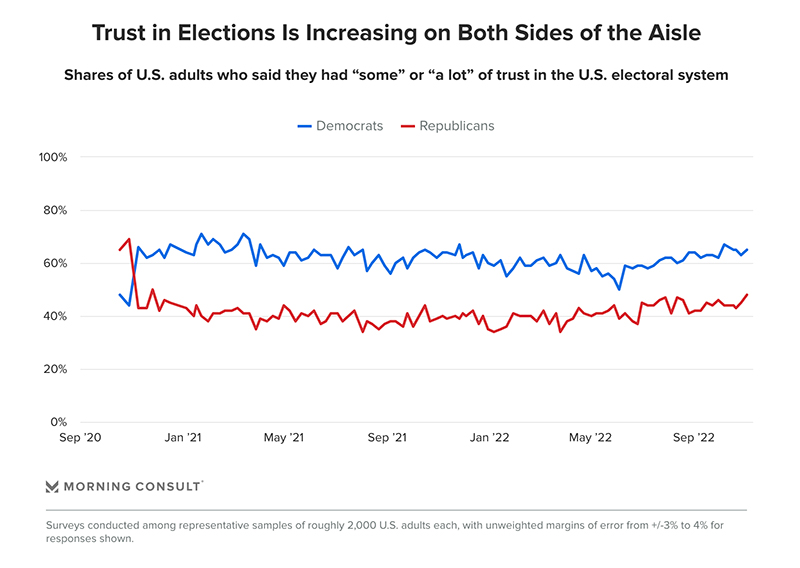Volcanoes are erupting in The Philippines, but on-fire Australia received some welcome rain. The Iran war cries have been called off and The Donald’s military powers are about to be hamstrung by the Senate. Meanwhile, his impeachment trial is starting, and we’re all on Twitter for a front-row seat.
What Could Go Right? The midterms were normal
High turnout and rejection of extremism show that American democracy lives on.
This is our weekly newsletter, What Could Go Right? Sign up here to receive it in your inbox every Thursday at 6am ET. You can read past issues here.
The midterms were normal
“These are, of course, not entirely normal times,” wrote The Progress Network (TPN) Member Matthew Yglesias in Bloomberg over the weekend. “They couldn’t possibly be, given the context of Trump’s stubborn lies about the 2020 election and the horrors of January 6.” The tension was exacerbated by the attack on Nancy Pelosi’s husband, Paul, in the days leading up to the midterms. This view of “not normal” is likely what The Washington Post editorial board had in mind when they ran an op-ed, also over the weekend, with the title “This is not a normal election. Voters should keep that in mind.”
But now the midterms have arrived, and while you may be disappointed or excited or both about the results, the midterms themselves were quite normal, the Democrats’ unexpected performance aside. As The New York Times opinion columnist Farhad Manjoo wrote, “The nightmare scenario was that we’d be mired in election-rigging conspiracies, lots of intimidation, perhaps even violence.” That has not panned out. American democracy lives on.
Plenty election deniers won, but plenty lost, too, such as Don Bolduc in the New Hampshire Senate race as well as several in gubernatorial races, like Pennsylvania’s Doug Mastriano, Michigan’s Tudor Dixon, and New York’s Lee Zeldin. “A significant bloc of voters,” wrote TPN Member Yascha Mounk in The Atlantic, split their ticket on Tuesday, showing a clear preference for moderate candidates. CNN anchor John Avlon put it more bluntly: “It’s the extremism, stupid.”
We should absolutely keep a watchful eye, and push back, on anyone now in government who sows distrust in the country’s elections. But there is the irony that any election deniers accepting the results of their own wins simultaneously endorse the working of the system. The “it’s only broken when my side loses” narrative can only last for so long. Indeed, according to exit polls from Edison Research, “8 in 10 voters said they were very or somewhat confident that elections in their state would be fair and accurate.”
Another sign of the nation’s democratic health is just how many voters want to participate in it. We’re waiting for final voter turnout tallies, but early signals are pointing to, once again, historic numbers. Midterm turnout reached a 40-year high in 2018 at 49 percent. This year is likely to top that. When the chips are down—perhaps especially when—Americans show up.

While large majorities of Americans agree that democracy is under threat, they also agree that it must be protected, even if that protective energy has become wildly misdirected in recent years. That may seem like pale comfort, but as Jonah Goldberg wrote in The Dispatch newsletter this week, “This is a good country full to the rafters with decent people. Are we perfect? Of course not. Have we sinned in the past? Obviously. But if you actually believe in democracy, you have to believe that Americans can correct their errors.”
As for how the House and Senate will end up, we don’t know yet, but Yglesias finishes his piece with a good reminder that despite all the rhetoric, “the basic underlying patterns of United States politics and policymaking have been extremely normal—up to and including Biden’s ability to work with Republicans on several significant pieces of bipartisan legislation.”
A night of firsts
In other midterm news, CNN compiled a list of historic firsts, including:
- Democrat Maxwell Frost: the first member of Generation Z elected to Congress
- Democrat Wes Moore: the first Black governor of Maryland
- Republican Sarah Huckabee Sanders: the first woman elected governor of Arkansas
- Democrat Maura Healey: the first out lesbian governor in US history
- Republican Markwayne Mullin: the first Native American senator from Oklahoma in almost 100 years
It was a successful midterm, representation-wise. Here is the list for Latino firsts, and here for Asian Americans, both from Axios.
Other notables
🪴 Maryland and Missouri have legalized cannabis; Arkansas and North Dakota voted against.
🚺 Michigan voters codified abortion rights—you might remember from our Roe v. Wade coverage that Michigan was one of the states where the upcoming election would prove decisive, and it has. (Michigan also voted to expand early voting access in the state.) Kentucky voters rejected an amendment that would have added language to the state constitution that it does not protect the right to an abortion, and Montana voters rejected a measure that would criminalize health care providers for not providing “life-saving care” to infants born at any stage of development, including as the result of an abortion. Abortion remains illegal in Kentucky and legal in Montana.
⚖️ Alabama, Tennessee, Vermont, and Oregon voted to change language in their state constitutions that allows for enslavement or involuntary servitude as part of criminal punishment. The last state that had this on the ballot, Louisiana, voted against after lawmakers directed voters to reject the measure’s ambiguous language. We’ll see if a better crafted version comes back up in the future.
How come no one cares about COP27?
Google searches for COP26, last year’s international climate conclave, registered a spike that COP27 is nowhere near matching. It looks like barely anyone is looking it up. Public interest aside, some productive things have already emerged from the meeting. Forty countries will produce detailed plans to reduce worldwide methane emissions by at least 30 percent of 2020 levels by 2030. That’s nothing to sniff at: if achieved, that would prevent more than 0.2 degrees Celsius of warming, says EcoWatch.
For the first time, led by Scotland, Europe has started to pledge cash for developing countries hit hard by climate change. The money, plus a United Nations early disaster warning system now in the works, could significantly help the Global South in particular save lives and prevent and recover from costly damage. And, the Bill & Melinda Gates Foundation has pledged $1.4 billion to smallholder farmers in sub-Saharan Africa and South Asia, which is good news for creating a food-secure future.
Before we go
Brazil avoided a coup in late October when Jair Bolsonaro, the outgoing, Trump-style president, finally greenlit the transition to winner Lula after two excruciating days of silence. “It’s a low bar to clear, but an important achievement nonetheless,” writes Francisco Toro in Persuasion. This shift in power is also positive for potential climate change action, as Lula has promised to prioritize ending deforestation of the Amazon. In Brazil as well as in the US and Europe, things are generally looking up when it comes to climate policy.
After two years of civil war, the Ethiopian government and the leader of the Tigray People’s Liberation Front have agreed to stop fighting, with an eye toward establishing permanent peace.
Below in the links section, self-resurrecting coral, gene-edited future foods, lab-grown blood, and more.

Turning the tide on hunger

While the progress of the past century is of little comfort to those suffering food insecurity and hunger today, it is a powerful testament to what is possible in the future. | Read more
Democracy on the ballot, climate change, and salary transparency | S3 E8

This week on the What Could Go Right? podcast: Will the COP27 conference strengthen action against global warming? Is democracy really on the ballot? And as crime remains a concern for many Americans, what’s really going on? Join Zachary Karabell and Emma Varvaloucas as they examine what’s happening today. | Listen to the episode
🎉 Help us share progress far and wide!
👉 Focusing only on the negative wrecks our mental health and sabotages potential improvements. We want to flip that narrative so as to usher in a future we can be proud of.
🙏 We’re a nonprofit, and our content remains free for all. Thank you for your support of our work.
Progress, Please
(Found good news? Tweet at us @progressntwrk or email.)
Other good stuff in the news 🔋
Energy & Environment:
- This coral reef resurrected itself—and showed scientists how to replicate it | NPR
- Coming soon: A $25,000 solar-powered electric SUV | Axios
- Puerto Rico’s fragile grid to get boost from networked batteries | Bloomberg
- Xcel to retire Texas coal-fired power plant early, speeding up companywide exit from coal to 2030 | Utility Dive
- EU’s CO2 emissions fall 5% in three months after post-Covid surge | Carbon Brief
- UK wind farms generate record electricity as temperature dips | Bloomberg
- Shipping lane change could be sea change for Sri Lanka’s blue whales | Mongabay
- Oslo to have fully electric public transportation by the end of 2023 | World Economic Forum
- How electric cars can provide backup power in emergencies | Bloomberg
- The return of the jaguar in the Yucatán Peninsula | The New York Times
- Why the feared wave of solar panel waste may be smaller and arrive later than we expected | Inside Climate News
Science & Tech:
- Demystifying electric car charging | Axios
- The weird-looking, fuel-efficient planes you could be flying in one day | The Wall Street Journal
- Seven ways CRISPR is shaping the future of food | Freethink
- AlphaFold’s new rival? Meta AI predicts shape of 600 million proteins | Nature
- Google AI‘s breathtaking potential | Axios
Politics & Policy:
- Czech Republic on the way to legalizing cannabis | DW
- On car-free streets, many New York restaurants thrived | The New York Times
- US and UAE sign strategic partnership deal to spur $100B in clean energy investment | CNBC
- US EPA grants $50M to communities to improve air quality monitoring | Reuters
- Pakistan Senate passes bill criminalizing torture of detainees | Dawn.com
- New laws in Ireland will criminalize incitement to hatred against transgender people | The Irish Times
- In a first, US pays tribes to move away from climate threats | The New York Times
- Michael Bloomberg announces a new initiative to phase out coal in 25 countries | The New York Times
Public Health:
- Blood test that spots concussions in 15 minutes makes emergency room debut | Bloomberg
- Scientists use mRNA technology to create a potent flu shot that could last for years | Inverse
- Magic-mushroom drug can treat severe depression, trial suggests | BBC
- Hate needles? Flu vaccines of the future could be skin patches delivered to your door. | The Boston Globe
- Lab-grown blood given to people in world-first clinical trial | BBC
- Pfizer launches trial of flu, Covid-19 combination vaccine | US News & World Report
Society & Culture:
- Women will have equal share of seats in New Zealand’s Parliament | RNZ
- Gender representation on S&P 500 boards reach new milestone | Axios
- How mixed-race neighborhoods quietly became the norm in the US | The Washington Post
- In Barcelona, kids bike to school in large, choreographed herds | Reasons to Be Cheerful
- This school took away smartphones. The kids don’t mind. | The Wall Street Journal
- In China, millions of women never learned to read. Can TikTok help? | Sixth Tone
Economy:
- Economic growth no longer means higher carbon emissions | The Economist
- The low-paid jobs where wages are rising fast | Stuff
- US payrolls surged by 261,000 in October, better than expected as hiring remains strong | CNBC
- Pandemic led to sharp spike in Black, Asian, and Latino homeownership | The Washington Post
- Hertz sees bigger profits as it accelerates transition to electric vehicles and lower costs | The Driven
TPN Member originals 🧠
(Who are our Members? Get to know them.)
- America dodged an arrow | Thomas L. Friedman
- The political press needs a time out | James Fallows
- Democrats pulled off one of the best midterms ever | Matthew Yglesias
- A record number of Black candidates are running on GOP tickets this midterm season. Here’s why that matters | Theodore R. Johnson
- UN efforts on Ukraine, however imperfect, highlight importance of international cooperation | Suzanne Nossel
- How to love people who love conspiracies | Arthur C. Brooks
- Russ Muirhead on the enduring appeal of conspiracy theory | Yascha Mounk
- How to depolarize deeply divided societies | Robert B. Talisse
- Lula will govern a different Brazil than when he was last in charge | Ian Bremmer
- What Bolsonaro’s loss reveals about the limits of populism | Yascha Mounk
- The obvious climate strategy nobody will talk about | Ted Nordhaus
- Where to live as the climate changes | Parag Khanna
- On colonialism and liberalism | Fareed Zakaria
- In conversation with Richard Dawkins on reason and rationality | Steven Pinker
- Will the Next Big Thing be (finally) humanoid robots? | James Pethokoukis
- Ads have become Big Tech’s Achilles’ heel | Scott Galloway
- Should we “go against nature”? | Jason Crawford
- ‘The Music Man,’ race, and Broadway | John McWhorter
Department of Ideas 💡
(A staff recommendation guaranteed to give your brain some food for thought.)
Is Thailand the new weed capital of the world? | Foreign Correspondent
From zero tolerance to decriminalization, Thailand’s recent u-turn on its cannabis laws is lighting up a billion-dollar industry.
Why we picked it: It’s an interesting and balanced look at the current cannabis situation in Thailand. It also accurately reflects what I’ve seen on the ground here (including all the loveliness of the Thai spirit). Some new weed rules may be forthcoming, but as one of the dispensary owners in the video says, there’s no going back—the genie is out of the bottle, and the bottle is broken. —Brian Leli
Until Next Time
In the immortal words of Harry Caray, “Cubs win!” 🦁


